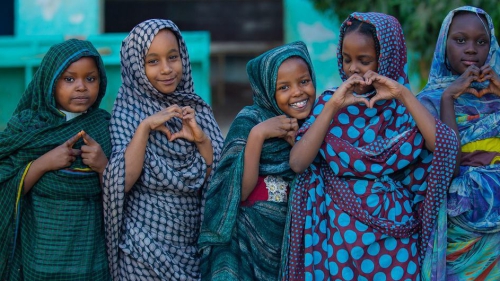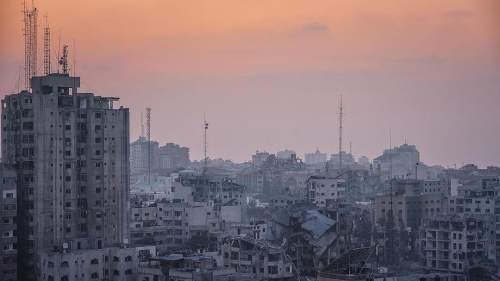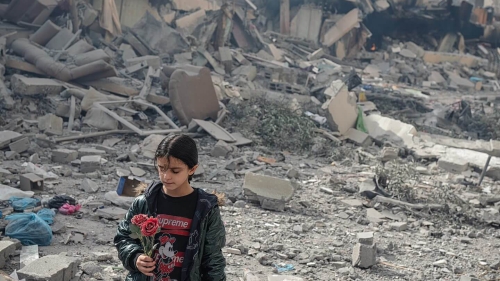The Rights of Women as Casualties of War
 |
Qurban-Bibi and Nahil Abu-Rada are two women, one Afghan and the other Palestinian, who made news with similar tragedies. But their losses also helped further delineate the plight of millions of women in war zones and poor countries.
The United Nations news service reported on the troubles of Qurban-Bibi, a pregnant woman who simply needed to reach a hospital. Doctors had instructed that she must deliver in an equipped medical facility, considering her previous Caesarean delivery. The desperately poor husband and her brothers opted for a delivery at home, citing the unaffordable taxi ride. The woman almost bled to death. When the delivery turned for the worst, the family rushed her to Faizabad hospital in a nearby province. Her life was saved, but, evidently not that of her baby.
Nahil's story also fails to deviate from the ever-predictable norm. The pregnant Palestinian woman was joined by her family on their way to a hospital in the West Bank city of Nablus. The hospital was so close, yet so far. Between their ambulance and salvation was an Israeli army checkpoint, Hawara. "Nothing helped. Not the pleas, not the cries of the woman in labor, not the father's explanations in excellent Hebrew, nor the blood that flowed in the car. The commander of the checkpoint, a fine Israeli who had completed an officers' course, heard the cries, saw the woman writhing in pain in the back seat of the car, listened to the father's heartrending pleas and was unmoved," reported Israeli journalist Gideon Levy in Haaretz. He added, "Nahil Abu-Rada is not the first woman to lose her baby this way because of the occupation, and she won't be the last."
The bearings of the painful losses of Qurban-Bibi and Nahil bring to mind two recently published reports pertaining to the rights of women and gender equality around the world: The State of the World Population 2008 report, produced by the United Nations Population Fund and The Global Gender Gap Report, published by the World Economic Forum.
The State of the World Population aims at development strategies that are sensitive to the uniqueness of particular cultures, for it found that culture is central to people's lives as are 'health, economics and politics'.
As for the Global Gender Gap report, it was a largely statistical study co-authored by researchers from Harvard and University of California-Berkeley, and published by the World Economic Forum. Researchers examined definite factors, such as jobs, education, politics, health, etc, to determine how improvements, or lack thereof in these areas have affected, or failed to affect, the equality between the sexes in 130 countries, that represent 90 percent of the world population. The outcome was predicable for the most part, but with notable deviations. "Out of 130 countries, Canada ranked 31 while the United States came in at 27. Canada also ranked behind Namibia, Sri Lanka, Mozambique, Cuba, Trinidad and Tobago, Lithuania and the Philippines, among other countries," reported Canada's Globe and Mail.
The reports raise many questions, present many challenges, but on their own fail to address the struggles and tragedies of women like Qurban-Bibi and Nahil Abu-Rada.
The Global Gender Report ignited media frenzy more appropriate for a beauty contest -winners and losers - not a pressing issue that continues to victimize millions of women worldwide. This was hardly the intent of the report, one would fairly assume. Expectedly, it was later turned into an opportunity to settle political scores, stereotype religion and, at times, disparage entire cultures.
The State of the World Population was largely sensible in its view of culture: non-Western cultures were not simply chastised as the problem, but cultural sensitivity was recommended as part of the solution.
But addressing women's rights and cultural patterns (as if these issues are not unique in time and space) without examining the underpinnings of the inequality is also a mistake.
Culture is hardly the summation of rational choices made by individuals in a specific time and easily demarcated space. It's an innate collective response to internal and external factors, changes and events - political, economic or social. Chances are Palestinian women in villages surrounded by Israeli checkpoints tend to deliver their babies at home or in an unfit local clinic, a natural response to risking losing one's baby altogether. Such a practice could eventually develop into a cultural pattern.
Many Afghan women are caught between the lethal occupation of foreigners and the extremism and vengeance of the Taliban. Early marriages are often the only available opportunity for women in some parts of the country, once they reach a certain age, sometimes as young as 9-years-old.
The same can be said about Iraq, where women, who comparatively achieved high status in pre-war years; have since endured untold humiliation. Thanks to the US 'liberation' of their country, they now constitute a large percentage of regional prostitution, a phenomenon alien to Iraqi society of yesteryear.
This hardly means that the suffering of women is always the outcome of foreign military interventions -masked as 'humanitarian' in some instances -nor does it render blameless local cultures, outdated customs and interpretation of religion. But what is missing from the reports, and subsequent analyses is how conflict, war and military intervention often jeopardize, more than anything else, the rights and welfare of women.
The issue of women's rights is a pressing one, not just because of the horrifying statistics. (Women and girls are the poorest, least educated and most victimized the world over.) But also because no real progress, development or sound governance can ever take place when half of the society is marginalized and mistreated. Equality between the genders is not an act of virtue, but also a sound strategy for a brighter future for any nation, rich or poor. To address the issue correctly, studies and reports must delve into the roots of women's suffering, and not be satisfied with numerical indicators that tell half of the story.
-Ramzy Baroud (www.ramzybaroud.net) is an author and editor of PalestineChronicle.com. His work has been published in many newspapers and journals worldwide. His latest book is The Second Palestinian Intifada: A Chronicle of a People's Struggle (Pluto Press, London).
Related Suggestions
I commented a week ago, but it was too "hot" for Muslims to handle, hence it was not posted or may be violated some of the posting rules due to hotness...
Sir Chander should learn from this and not be assumptive like Bush and create a mess and making a fool of himself on the worldstage.





























